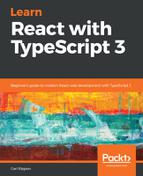In this section, we are going to explore how we can handle errors when using callback code:
- Let's start by entering the following code in the TypeScript playground:
try {
setTimeout(() => {
throw new Error("Something went wrong");
}, 1000);
} catch (ex) {
console.log("An error has occurred", ex);
}
We are again using setTimeout to experiment with callbacks. This time, we throw an error inside the callback. We are hoping to catch the error outside the callback using a try / catch around the setTimeout function.
If we run the code, we see that we don't catch the error:

- We must handle errors within the callback. So, let's adjust our example to the following:
interface IResult {
success: boolean;
error?: any;
}
let result: IResult = { success: true };
setTimeout(() => {
try {
throw new Error("Something went wrong");
} catch (ex) {
result.success = false;
result.error = ex;
}
}, 1000);
console.log(result);
This time, the try / catch is within the callback. We use a variable, result, to determine whether the callback was executed successfully, along with any error. The IResult interface gives us a nice bit of type safety with the result variable.
If we run this code, we'll see that we successfully handle the error:

So, handling errors along with reading callback-based code is a challenge. Luckily, there are alternative approaches that deal with these challenges, which we'll go through in the next sections.
